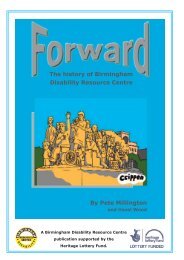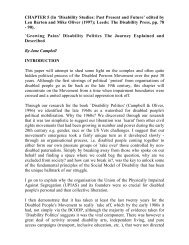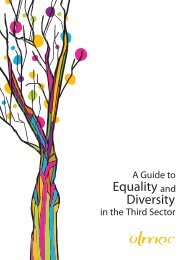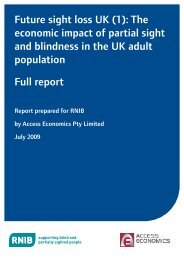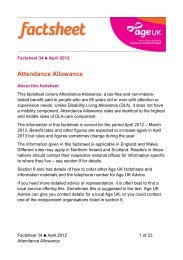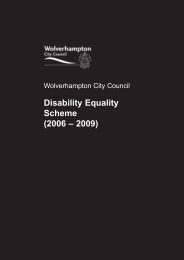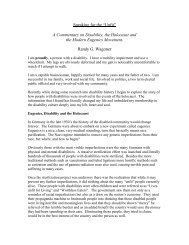What equality law means - Birmingham Disability Resource Centre
What equality law means - Birmingham Disability Resource Centre
What equality law means - Birmingham Disability Resource Centre
Create successful ePaper yourself
Turn your PDF publications into a flip-book with our unique Google optimized e-Paper software.
stairs etc. Physical features do not include furniture,<br />
furnishings, materials, equipment or other chattels in or<br />
on the premises.<br />
positive action<br />
positive discrimination<br />
pre-employment disability<br />
and health enquiries<br />
pregnancy and maternity<br />
If an employer reasonably thinks that people sharing a<br />
certain protected characteristic suffer a disadvantage<br />
connected to that characteristic or have different needs,<br />
or if their participation in work or other activity is<br />
disproportionately low, an employer can take any action<br />
(which would otherwise be discrimination against other<br />
people) which is a proportionate <strong>means</strong> of enabling or<br />
encouraging those people to overcome or minimise<br />
their disadvantage or to participate in work or other<br />
activities or meeting their needs. For example, an<br />
employer can put on training courses exclusively for<br />
workers with a particular protected characteristic. An<br />
employer is not allowed to give preference to a worker<br />
in recruitment or promotion because they have a<br />
protected characteristic.<br />
Treating someone with a protected characteristic more<br />
favourably to counteract the effects of past<br />
discrimination. It is generally not <strong>law</strong>ful, although more<br />
favourable treatment of workers because of their<br />
disability is permitted if the employer so wishes.<br />
Moreover, the duty to make reasonable adjustments<br />
may require an employer to treat a worker more<br />
favourably if that is needed to avoid a disadvantage.<br />
Generally, an employer must not ask about disabilities or<br />
the health of a job applicant before they have been<br />
offered the job. If the employer does ask such questions<br />
and then fails to offer the applicant the job, the fact that<br />
the employer made such enquiries will shift the burden<br />
of proof if the applicant brings a claim for disability<br />
discrimination. The Equality and Human Rights<br />
Commission can also take legal action against the<br />
employer if such enquiries are wrongly made. More<br />
detail is set out in the guide, ‘<strong>What</strong> <strong>equality</strong> <strong>law</strong> <strong>means</strong><br />
for you as an employer: when you recruit someone to<br />
work for you’.<br />
Pregnancy is the condition of being pregnant or<br />
expecting a baby. Maternity refers to the period after<br />
97




